Related Research Articles

The Birmingham Small Arms Company Limited (BSA) was a major British industrial combine, a group of businesses manufacturing military and sporting firearms; bicycles; motorcycles; cars; buses and bodies; steel; iron castings; hand, power, and machine tools; coal cleaning and handling plants; sintered metals; and hard chrome process.

NSU Motorenwerke AG, or NSU, was a German manufacturer of automobiles, motorcycles and pedal cycles, founded in 1873. Acquired by Volkswagen Group in 1969, VW merged NSU with Auto Union, creating Audi NSU Auto Union AG, ultimately Audi. The name NSU originated as an abbreviation of "Neckarsulm", the city where NSU was located.

Albert Augustus Pope was a Brevet Lieutenant-Colonel in the Union Army. He was an importer, promoter, and manufacturer of bicycles, and a manufacturer of automobiles.

Elmore Manufacturing Company was a manufacturer of veteran and brass era automobiles and bicycles (1893–97), headquartered at 504 Amanda Street, Clyde, Ohio, from 1893 until 1912. The company took its name from a small parcel of land in Clyde with the name Elmore associated with it where a stave mill was established originally, then evolved into bicycle production. The village of Elmore, Ohio is located 20 mi (32.2 km) to the east. Founded by Harmon Von Vechten Becker and his two sons, James and Burton, the Elmore used a two-stroke engine design, in straight twin or single-cylinder versions. They later produced a straight-3 followed by a straight-4 beginning in 1906 until production ended in 1912. The company advertising slogan was "The Car That Has No Valves", referring to the two-stroke engine.
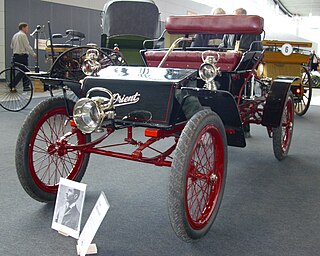
Waltham Manufacturing Company (WMC) was a manufacturer of bicycles, motorcycles, motorized tricycles and quadricycles, buckboards, and automobiles in Waltham, Massachusetts. It sold products under the brand names Orient, Waltham, and Waltham-Orient. The company was founded in 1893, moving to self-propelled vehicles after 1898.

Thomas Buckland Jeffery was a British emigrant to the United states who co-founded the Gormully & Jeffery company which made the Rambler bicycle. He invented the "clincher" rim which was widely used to fit tires to bicycles and early automobiles, and in 1900 established the Thomas B. Jeffery Company to make automobiles, again using Rambler branding.
Pope Manufacturing Company was founded by Albert Augustus Pope around 1876 in Boston, Massachusetts, US and incorporated in Hartford, Connecticut in 1877. Manufacturing of bicycles began in 1878 in Hartford at the Weed Sewing Machine Company factory. Pope manufactured bicycles, motorcycles, and automobiles. From 1905 to 1913, Pope gradually consolidated manufacturing to the Westfield Mass plant. The main offices remained in Hartford. It ceased automobile production in 1915 and ceased motorcycle production in 1918. The company subsequently underwent a variety of changes in form, name and product lines through the intervening years. To this day, bicycles continue to be sold under the Columbia brand.
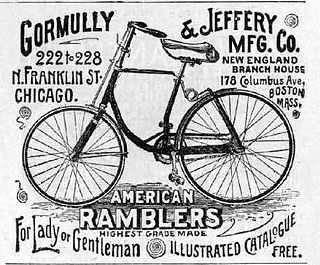
Rambler was an American bicycle brand manufactured by the Gormully & Jeffery Manufacturing Company (G&J) in Chicago from 1878 to 1900 and subsequently by the American Bicycle Company.

Frederick Samuel Duesenberg was a German-born American automobile and engine designer, manufacturer and sportsman who was internationally known as a designer of racecars and racing engines. Duesenberg's engineering expertise influenced the development of the automobile, especially during the 1910s and 1920s. He is credited with introducing an eight-cylinder engine, also known as the Duesenberg Straight-8 engine, and four-wheel hydraulic brakes, a first for American cars, in addition to other mechanical innovations. Duesenberg was also patentholder of his designs for a four-wheel hydraulic brake, an early automatic transmission, and a cooling system, among others. Fred and his younger brother, August "Augie" Duesenberg, shared the patents, filed in 1913 and renewed in 1918, for their "walking beam" four-cylinder engine and the Duesenberg Straight 8.

Armand Peugeot was a French industrialist, pioneer of the automobile industry and the man who transformed Peugeot into a manufacturer of bicycles and, later, of automobiles. He was accepted into the Automotive Hall of Fame in 1999.

Gräf & Stift was an Austrian manufacturer of automobiles, trucks, buses and trolleybuses, from 1902 until 2001, latterly as a subsidiary of MAN. It was founded in 1902 by the brothers Franz, Heinrich and Karl Gräf, and the investor, Wilhelm Stift. Before the Second World War, the company was a well-known manufacturer of luxury automobiles, including the Double Phaeton that carried Archduke Franz Ferdinand and his wife, Sophie, when they were assassinated in Sarajevo in June 1914. By the 1930s Gräf & Stift had begun making trucks and buses, and it ceased car manufacturing in 1938. The company merged with Österreichische Automobil Fabriks-AG (ÖAF) in 1971, becoming ÖAF-Gräf & Stift AG, and later the same year was taken over by MAN AG. It continued in business as a subsidiary of MAN, and the Gräf & Stift name remained in use as a MAN brand for the Austrian market and for trolleybuses until 2001, when ÖAF-Gräf & Stift AG was renamed MAN Sonderfahrzeuge AG. It was located in Vienna, and the production facilities continue in use there, but no longer using the Gräf & Stift name.

The Eysink was a Dutch automobile manufactured from 1903 until 1919.

Gaeth was an American steam automobile manufactured in Cleveland, Ohio from 1902 until 1911.

American Bicycle Company (1899-1903) was an American bicycle company (Trust) led by Albert Augustus Pope. The company was formed to consolidate the manufacturers of bicycles and bicycle parts. In the 1890s the advancements in bicycle design led to unprecedented demand for the new Safety bicycles. The "American Bicycle Company" trust only lasted for three years.

Henry John Lawson, also known as Harry Lawson, was a British bicycle designer, racing cyclist, motor industry pioneer, and fraudster. As part of his attempt to create and control a British motor industry Lawson formed and co floated The Daimler Motor Company Limited in London in 1896. It later began manufacture in Coventry. Lawson organised the 1896 Emancipation Day drive now commemorated annually by the London to Brighton Veteran Car Run on the same course.

The Campion Cycle Company was a British bicycle, cyclecar and motor cycle maker, active from 1893 to 1926 and based in Nottingham, England. In 1927 it was purchased by Currys.
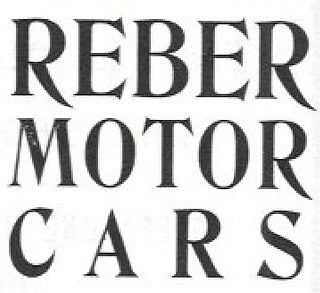
The Reber was a make of American automobile manufactured at Reading, Pennsylvania from 1902 until 1903. It was made by the Reber Manufacturing Company, founded in 1901 by James C. Reber.
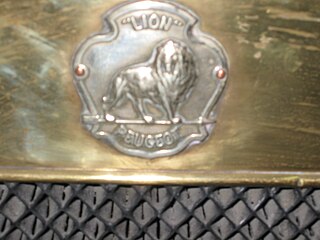
Lion-Peugeot is a formerly independent French auto-maker. It is the name under which in 1906 Robert Peugeot and his two brothers, independently of the established Peugeot car business, began to produce automobiles at Beaulieu near Valentigney.

Overman Wheel Company was an early bicycle manufacturing company in Chicopee Falls, Massachusetts from 1882 to 1900. It was known for bicycles of higher quality and lower weight than other bicycles of its time. Despite a nationwide bicycle craze in the late 1800s, the company was undercut by lower-priced competition, nearly went bankrupt in 1897, and never recovered from an 1899 fire. The company was sold in 1900.
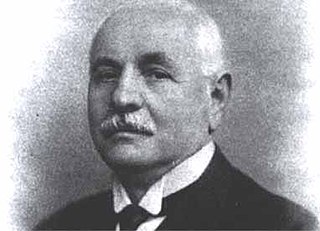
Edoardo Bianchi was an Italian entrepreneur and inventor who founded the bicycle manufacturing company Bianchi in 1885 and the Italian automobile manufacturer Autobianchi. Much like Henry Ford was to the modern automobile, Edoardo Bianchi was to the modern bicycle. His business and manufacturing innovations coupled uniquely well with the technical contributions provided by his company’s “Reparto Corse,” securing Bianchi’s place on the podium as one of the most influential manufacturers in bike racing history and cycling at large.
References
- 1 2 3 4 Georgano, Nick (2000). The Beaulieu Encyclopedia of the Automobile. London: Stationery Office. p. 1792. ISBN 0117023191.
- 1 2 Kimes, Beverly Rae (1996). The Standard Catalog of American Cars: 1805-1942. Iola, IA: Krause Publications. p. 1612. ISBN 0873414284.